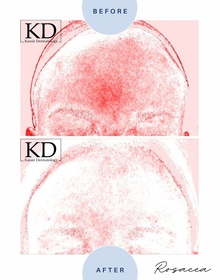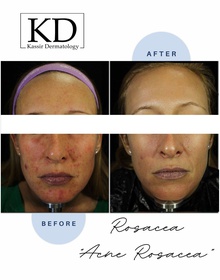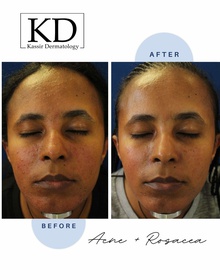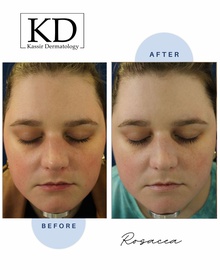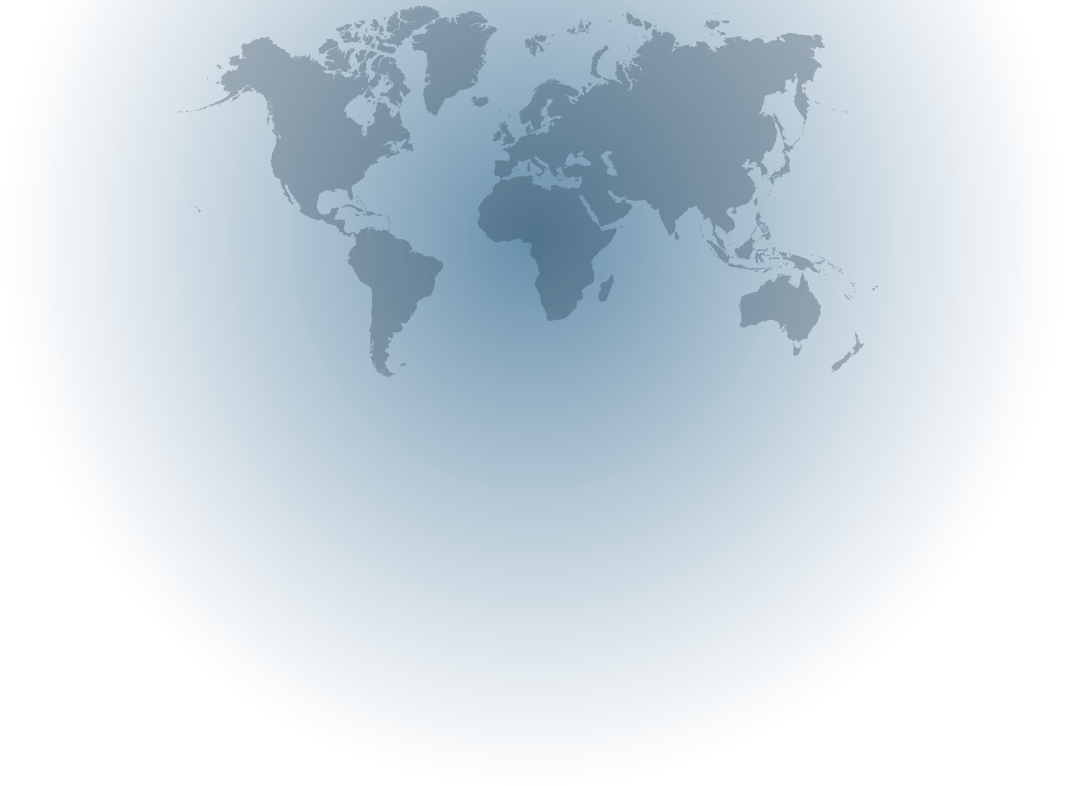
ROSACEA

Rosacea is a common skin condition that causes redness of the face and can produce small, red bumps. It may be mistaken for rosy cheeks, a sunburn, an allergic reaction or other skin problems, such as acne.
The main symptoms of rosacea include a flushed face, red or pink patches, visible tiny broken blood vessels, small red bumps (sometimes containing pus) and pink or irritated eyes.
Most people with this condition may not even know they have rosacea or that it is a diagnosable and treatable condition, and just assume they blush or flush easily or are just very sun sensitive.
Request More Info About
ROSACEA
ROSACEA IN DEPTH
by Martin Kassir, M.D., F.A.A.D.
Left untreated, rosacea tends to worsen over time. While there's no cure for rosacea, treatments can control and reduce the signs and symptoms. The condition appears to be related to an inflammatory process, as well as vascular hyperactivity. It is thought that there is a breakdown in the skin-barrier function in which irritants invade the epidermis, causing vasodilatation, flushing and inflammation.
There are triggers that can cause flare ups or can worsen the condition which include but are not limited to alcohol, hot or spicy foods, emotional stress, heat, and exposure to sun. Avoiding or decreasing these triggers can help lessen symptoms.
IPL (Intense Pulse Light) treatments can effectively treat Rosacea. This pulsed light technology improves age spots, freckles, broken capillaries, blushing, flushing, and signs of rosacea. A series of treatments are initially necessary followed by maintenance treatments.
Rosacea Before & After Gallery
Click here to see the rosacea gallery

Severe Rosacea with marked flushing, redness, and inflammation of cheeks and nose. Note the impressive improvement after several IPL treatments. IPL treatments for Rosacea and …

This patient came in for redness of the face. After being being enrolled into the Kassir Dermatology Rosecea protocol, patient resulted in exceptional improvement of …
aSKINg the EXPERT: Rosacea
What is Roseacea, what is the cause, and how is it treated?
Rosacea is a chronic skin disease. It usually involves the face and is characterized by persistent erythema (redness from congested capillaries). Roseacea can be seen in both men and women. There can be acute episodes of edema (swelling), pustules and papules. The exact cause of rosacea is unknown.
Rosacea can be treated with IPL (Intense Pulse Light) therapy.
Can creams and antibiotics be used to treat rosacea?
Both creams and oral antibiotics may be used to treat rosacea; however, these treatments have not shown to be consistently effective.
Will my rosacea be totally resolved after treatment?
Rosacea is managed with treatment to minimize the effect and symptoms, rather than totally resolve the condition. The patient's role is also critically important in the management and treatment of rosacea. Patients can help maximize their treatments by minimizing triggers such as sun exposure, heat, cold, spicy foods, and alcohol.
ROSACEA News
Triggers of Rosacea
by Martin Kassir, M.D., F.A.A.D.

Signs and Symptoms of Rosacea
by Martin Kassir, M.D., F.A.A.D.

Rosacea Treatment (Redness or Flushing)
by Martin Kassir, M.D., F.A.A.D.

Kassir Dermatology © 2025






